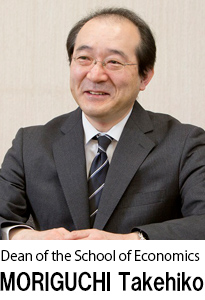Message from the Dean

The School of Economics at the University of Toyama traces its roots to 1924, when it was founded as Takaoka Commercial High School. During more than 90 years of its history, the School went through various changes, but constantly produced graduates who made valuable contributions to society.
School of integrated social sciences
The School of Economics provides an integrated study of social sciences by combining three departments: Department of Economics, Department of Business Administration, and Department of Business Law. More than 60 instructors have diverse research interests that range from economics, business administration and law to politics, history and sociology. Close linkages among the three departments have created a unique educational system.
Basic study of social sciences for all students
At the School of Economics, freshmen begin their studies with lectures on the basics of economics, business administration, and business law. These subjects are compulsory because the fundamental knowledge of social sciences is of great help for developing a clear view of the complex modern society. In addition, freshmen are studying general lectures in liberal arts that are taught by instructors from other schools. These lectures include a wide range of subjects, from arts to natural sciences, so students can develop a broad viewpoint for their later studies of social science.
Course system to promote individual interests and future careers
Second-year students in the day-time course could choose among seven courses that focus on economics and business administration, business administration and law, and economics and law. This course system aims to provide students with inter-disciplinary education, so students could study subjects that are not provided in their affiliated departments. In addition, students could choose courses that concentrate on a single field of study. This kind of curriculum is designed to meet the needs of both students and the society.
Advanced Program
The School of Economics offers an Advanced Program from 2018, with three themes: International Business, Finance, and Administration Management. During this program, students can study abroad as well as attend problem-solving seminars and practical lectures. Students with sufficient credits will be awarded a certificate of this program completion. We hope that they acquire the problem-solving ability and communication skills and use their knowledge and skills effectively in the future.
The flexible learning styles at the evening course
For people who cannot enroll in the day-time course because of work or other reasons, the School offers an evening course, where all classes start after 18:00. The evening course is also more affordable in terms of examination fees, admission fees, tuition fees, among other things fees, among other things.
Small-group seminars
Small-group education is a principal feature of the School of Economics. For students entering the School in academic year 2018 or later, small-group education will be provided seamlessly from entry to graduation, including in the Introductory Seminar, Basic Seminar, Special Seminar, and during support with students’ Graduation Thesis and Graduation Research. In addition, it is possible to join other seminars as optional seminars. Since specialized seminars are taught by around 60 school members, students can advance in their studies according to their interests and the degree of awareness about their chosen problem. The seminars offer various study programs that range from reading of specialized literature to research presentations at various seminar and research exchanges with domestic and overseas universities.
Bridge to the business world
Modern social science has deepened our knowledge about the real world by finding answers to acute problems in our society. Focusing on such mutual relationships between the academic and real world, the School offers courses and seminars held by academic staff with a variety of business experience, as well as courses that are endowed by banks and securities companies.
Connection to the world
The School of Economics has academic exchange agreements with several overseas universities, most of which are located in Asia. Students could use a credit transfer system with other universities, so that their graduation is not delayed by long-term studies abroad. At present, more than 50 international students are studying at the School of Economics and the Graduate School of Economics, including students from China, Korea, Malaysia, Vietnam, and Russia.
Sharing Research Results with the Society
Our school members are actively participating in various academic activities, including the publication of books and articles in a wide range of academic journals, the membership in a variety of domestic and international academic societies, and the participations in diverse research projects. In addition to the basic research expected of a national university, the School accepts commissions for research into solutions for regional problems and is a force behind academic research projects with an East Asian overview.
To new students
Congratulations on your entry into our school. You are probably going to have a lot of free time while you are at the university. However, this is also a time in which we must learn to think for ourselves and take responsibility for our actions.
Within society’s problems, the economy, business, and the law are intertwined. Being a school of integrated social science, the School of Economics deals with these three fields jointly, and we hope to support our students in developing the ability to succeed in society as community members with independent opinions. In social sciences, unlike in natural sciences, a question always has more than one answer. That is one reason it is very interesting. However, it is also important to take responsibility for one’s own choices. This is what we want our students to learn.